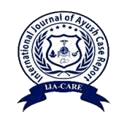Ayurveda Management of Ascites secondary to End Stage Alcoholic Fatty Liver Disease : A Single Case Study
Abstract
Alcohol is considered one of the commonest causes of cirrhosis of the liver in men, especially in countries like India. Jalodara (ascites) is the pathologic accumulation of fluid within the peritoneal cavity. It is the most common complication of cirrhosis and occurs in about 50% of patient with decompensated cirrhosis in 10 years. The development of ascites denotes the transition from compensated to decompensated cirrhosis. Mortality increases from complications such as spontaneous bacterial peritonitis and hepatorenal syndrome. Mortality ranges from 15% in a year to 44% in 5 years. It can be also called Shotha (anasarca). Here Ayurveda plays a revolutionary role in decreasing symptoms and reducing the chances of recurrent ascites. It involves Nidana Parivarjana (stopping the causative factors), dietary changes (primarily on Milk diet) and medicines. A 39 years old male comes to our OPD with complaints of severe abdominal distension, pedal edema, anorexia, polyarthralgia and scrotal swelling since 6 months. He was admitted and put on only a Milk diet with Shothahara Chikitsa along with Nitya Virechana and Asthapana Basti for 45 days. Every day during hospitalization patient’s weight, abdominal girth, input-output along with other vitals such as blood pressure, pulse rate and respiratory rate was monitored closely. After 1 week of medications, the patient’s condition improved. All parameters including abdominal girth, body weight, pedal edema, and liver enzymes were reduced satisfactorily. This provides evidence for effectiveness of Ayurveda in management of ascites in end stage liver disease.

